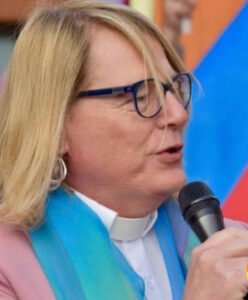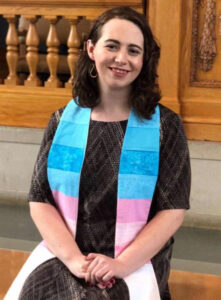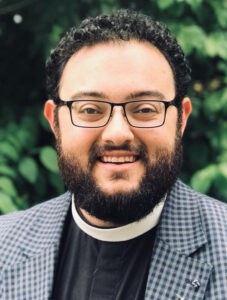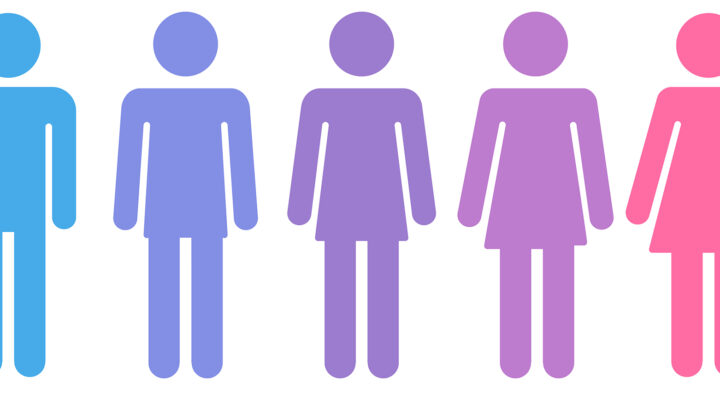Being transgender and Christian doesn’t have to create distress, trans minister Donnie Anderson said during a webinar held to familiarize churches with that segment of the LGBTQ community.
“I hope young people today, and other people as well, will never have to struggle with the question I struggled with, and which I know others struggle with: that … I can either be authentically who I am or I can be a person of faith, but I can’t be both. I’m here as living testimony to the fact that you can be both,” said Anderson, interim minister of Pilgrim United Church of Christ in New Bedford, Mass., during “Welcoming the Transgender Community,” a May 4 virtual panel discussion presented by the Association of Welcoming and Affirming Baptists.

Donnie Anderson
Anderson, who also serves as an AWAB board member, was joined on the panel she moderated by Erica Saunders, among the first openly transwomen ordained into Baptist ministry and pastor of Peace Community Church in Oberlin, Ohio, and by Dante Tavolaro, rector of St. Thomas Episcopal Church in Greenville, R.I.
AWAB announced the webinar as an opportunity to acquaint viewers with the challenges and joys of the transgender experience, to help engender “a sense of comfort with the transgender community” and to introduce them to trans clergy.
To that end, Anderson, Saunders and Tavolaro shared their coming out stories and how they overcame prejudices within families and religious communities.
While born in a male body, Saunders said she felt like a girl from an early age and that keeping that secret tormented her throughout childhood and early adulthood.
“That made me feel like a freak, like something was wrong with me because when I was alone, either playing in the yard or in those last moments before sleep, I knew I had a secret. I felt like a girl on the inside and nobody else felt that way — or so I thought.”
Worse still, the messages she heard growing up in church instilled in her additional fear and self-loathing. “I felt shame because of what I heard preached in church, a little independent Baptist community in rural North Carolina. Queer and trans folks went against God’s plan, and people like me who followed that path belonged in hell. So, I pushed my feelings deep down inside.”

Erica Saunders
But the acceptance she felt coming out to friends in college inspired her to transition, a process she undertook while earning her master of divinity degree at Wake Forest University School of Divinity.
With her inward and outward realities finally in sync, the spiritual impact was powerful, Saunders explained. “For the first time, the divine presence became real for me. I could interact authentically without hiding who I was. I learned to love others and how to be loved. Today, I couldn’t feel happier, and I thank God for every day I get to live my truth.”
Tavolaro, who was born female, grew up a tomboy and stayed one long after other girls in his circle began embracing more traditionally female attire and behaviors. “I didn’t have any language for this,” he said. “I just fit in better with boys than with girls.”
Feeling a calling to ministry in the seventh grade, he was placed on the fast track to eventual ordination through training, leadership positions and being sent to national conventions. During his college years he came out as male in every area of his life except church. However, he eventually realized during college he had to be transparent with his faith community.

Dante Tavolaro
“So, I came out to my priest at the time. He says, ‘I love you just the way you are, and if anyone gives you a hard time, you tell me and I will take care of it.’”
Anderson recalled that she knew very early on something was different about her in the male body she inhabited. But sharing that with her mother did not go well.
“I now understand that at 9 years old, I entered a deep dark closet, shut the door, bolted it tight and for six decades I lived in that closet. But there were times when my true self banged on that door like crazy.”
While keeping that truth to herself, Anderson answered a calling and embarked on a career in a variety of ministry settings. Then in August 2017, she came out to her family and the rest of the world. She was 69 and serving as executive minister for the Rhode Island State Council of Churches.
“The Rhode Island State Council of Churches voted unanimously to support my transition and to keep my job open for me,” she noted.
While many nasty insults were hurled at her, the overwhelming reaction was positive, she said. “My dream was to be able to live out authentically as a minister and now I get to live that dream every single day. I go to bed and say, ‘Thank you,’ because I get to be me.”
The panelists also shared suggestions for individuals and congregations interested in becoming welcoming of transgender persons.
Tavolaro advised churches to be prepared for the learning curve that comes with a welcoming and affirming ministry. “Accept and know and come to terms with the fact that you are going to fail. You’re going to mess things up. You’re going to get stuff wrong. Knowing that up front will help you be prepared to be corrected and to help keep a posture of openness and to continue to learn and not get defensive.”
Paraphrasing Black lesbian poet Pat Parker’s poem, “For the White Person Who Wants to Know How to be My Friend,” Saunders advised churches to forget that a trans person is trans, and yet to never forget that fact.
“While trans folks have a lot of special needs, especially when we are early on in transition or if we carry some church hurt with us, that at the end of the day we are just human beings and being trans is just one thing about us. If you have a trans person who shows up in your church, just treat them like you would any other human being.”
Related articles:
Why being transgender is not a sin | Opinion by Mark Wingfield
Q&A with June Joplin on life as an itinerant (transgender) preacher


